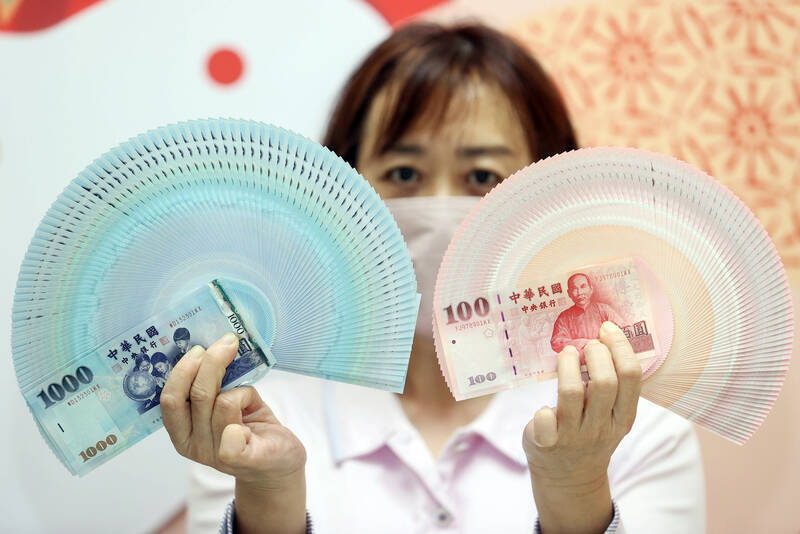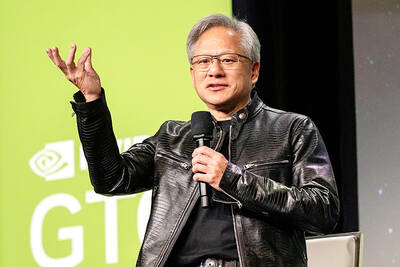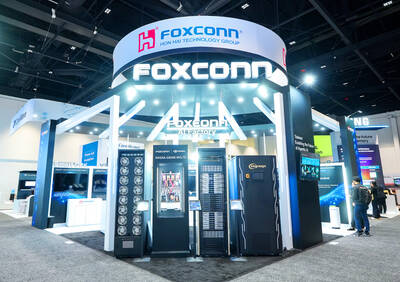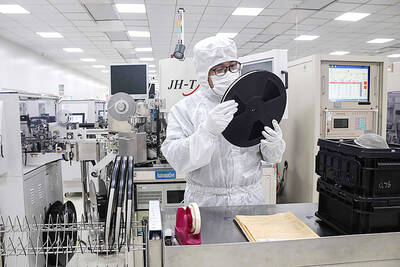The nation’s money supply last month rose slightly, as demand and time deposits increased, even though foreign investors cut their holdings and wired money abroad, the central bank said yesterday.
The narrow M1B money supply gauge grew 2.68 percent from a year earlier, while the M2 broad supply reading rose 6.7 percent, the central bank said.
The pickup in M1B — referring to cash, demand deposits and other liquid deposits — had to do with the government’s distribution of a NT$6,000 (US$195) tax rebate, which mostly went to people’s demand deposit accounts, the central bank said.

Photo: CNA
The M1 measure was also supported by increasing securities accounts, whose balance grew by NT$47.8 billion to NT$3.19 trillion by the end of last month, the central bank said.
The rise in securities accounts came even though foreign portfolio managers cut their positions in local shares by NT$78 billion and wired capital and profit abroad, sinking their savings deposits to a two-year low of NT$196.9 billion, the central bank said.
CAPITAL FLIGHT
The capital flight dragged the benchmark TAIEX by 1.8 percent after Taiwan Semiconductor Manufacturing Co (台積電) gave a conservative business guidance for this quarter and lowered its revenue forecast for this year.
The sole chip supplier for Apple Inc’s iPhone series also said that inventory adjustments by major customers would stretch into the third quarter, dashing hopes of a quick recovery.
The M2 measure, which encompasses time deposits, time saving deposits, foreign currency deposits, mutual funds and M1B, registered a double-digit percentage increase in time deposits encouraged by interest rate hikes, the central bank said.
It dismissed concerns that the rapid increase in time deposits would deny the local bourse liquidity and growth momentum, saying that the market remains active in light of improving daily turnover.

It was late morning and steam was rising from water tanks atop the colorful, but opaque-windowed, “soapland” sex parlors in a historic Tokyo red-light district. Walking through the narrow streets, camera in hand, was Beniko — a former sex worker who is trying to capture the spirit of the area once known as Yoshiwara through photography. “People often talk about this neighborhood having a ‘bad history,’” said Beniko, who goes by her nickname. “But the truth is that through the years people have lived here, made a life here, sometimes struggled to survive. I want to share that reality.” In its mid-17th to

‘MAKE OR BREAK’: Nvidia shares remain down more than 9 percent, but investors are hoping CEO Jensen Huang’s speech can stave off fears that the sales boom is peaking Shares in Nvidia Corp’s Taiwanese suppliers mostly closed higher yesterday on hopes that the US artificial intelligence (AI) chip designer would showcase next-generation technologies at its annual AI conference slated to open later in the day. The GPU Technology Conference (GTC) in California is to feature developers, engineers, researchers, inventors and information technology professionals, and would focus on AI, computer graphics, data science, machine learning and autonomous machines. The event comes at a make-or-break moment for the firm, as it heads into the next few quarters, with Nvidia CEO Jensen Huang’s (黃仁勳) keynote speech today seen as having the ability to

NEXT GENERATION: The company also showcased automated machines, including a nursing robot called Nurabot, which is to enter service at a Taichung hospital this year Hon Hai Precision Industry Co (鴻海精密) expects server revenue to exceed its iPhone revenue within two years, with the possibility of achieving this goal as early as this year, chairman Young Liu (劉揚偉) said on Tuesday at Nvidia Corp’s annual technology conference in San Jose, California. AI would be the primary focus this year for the company, also known as Foxconn Technology Group (富士康科技集團), as rapidly advancing AI applications are driving up demand for AI servers, Liu said. The production and shipment of Nvidia’s GB200 chips and the anticipated launch of GB300 chips in the second half of the year would propel

The battle for artificial intelligence supremacy hinges on microchips, but the semiconductor sector that produces them has a dirty secret: It is a major source of chemicals linked to cancer and other health problems. Global chip sales surged more than 19 percent to about US$628 billion last year, according to the Semiconductor Industry Association, which forecasts double-digit growth again this year. That is adding urgency to reducing the effects of “forever chemicals” — which are also used to make firefighting foam, nonstick pans, raincoats and other everyday items — as are regulators in the US and Europe who are beginning to